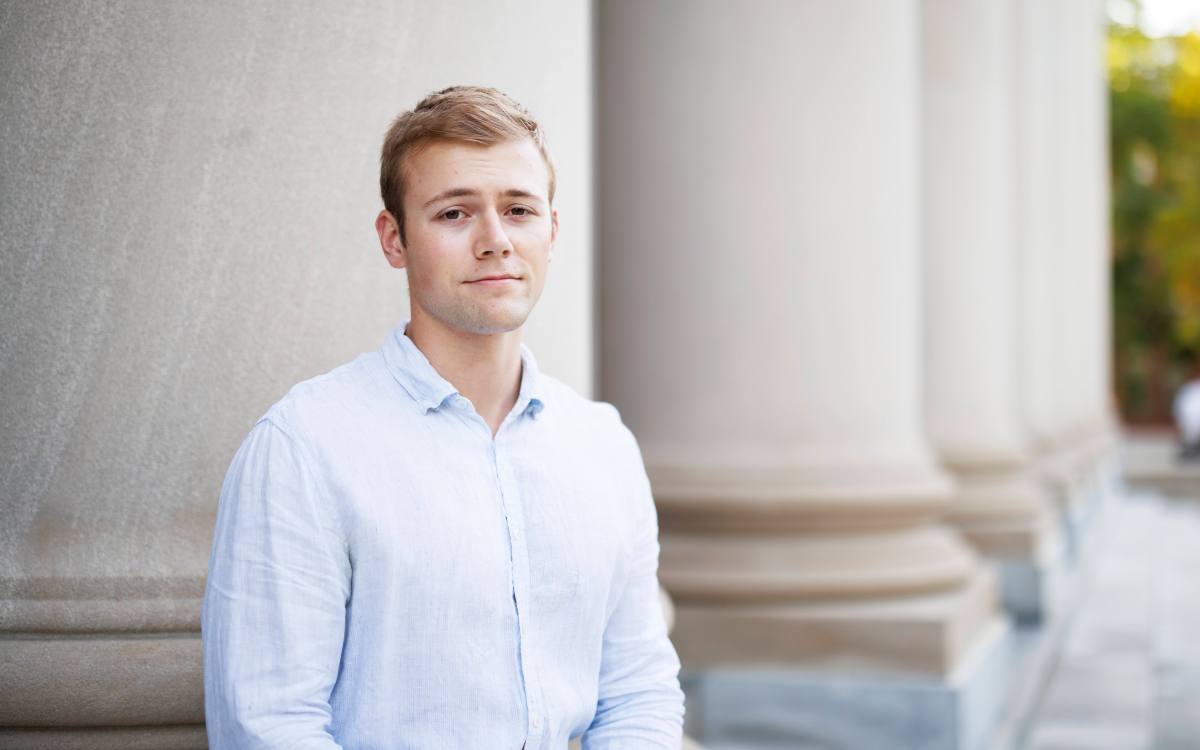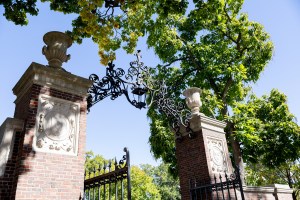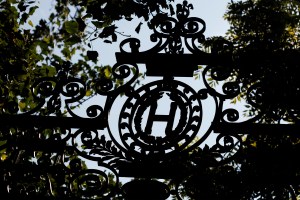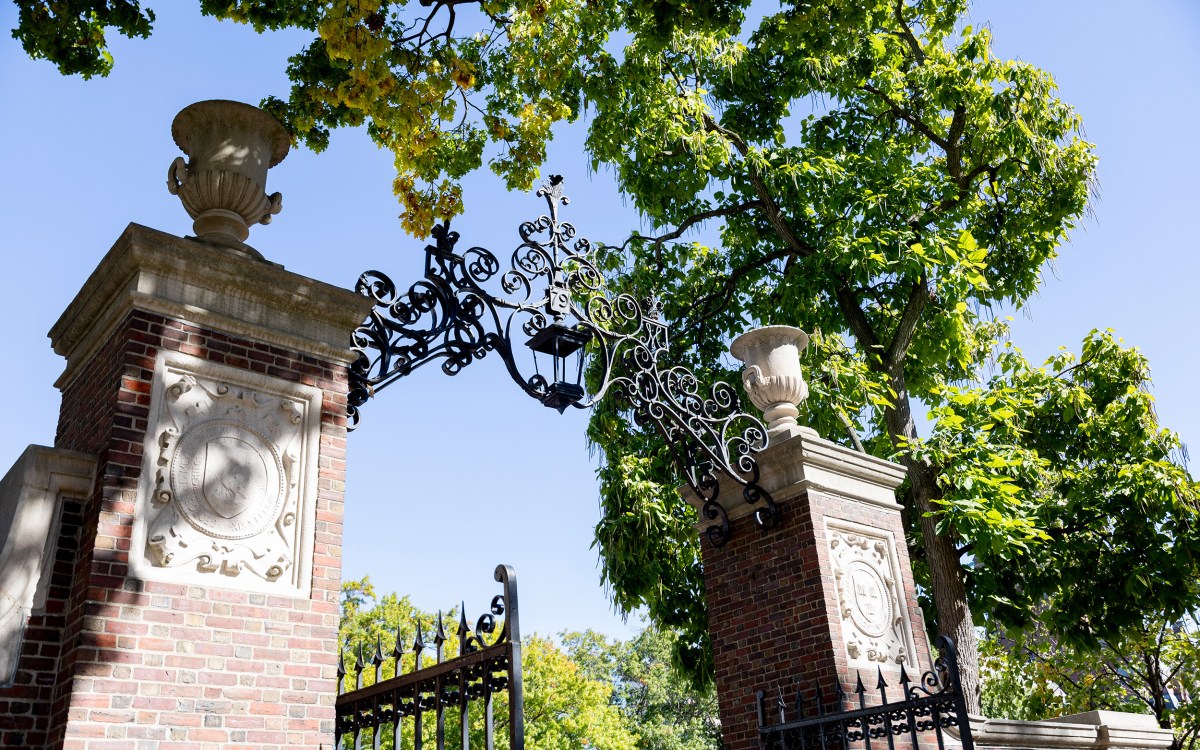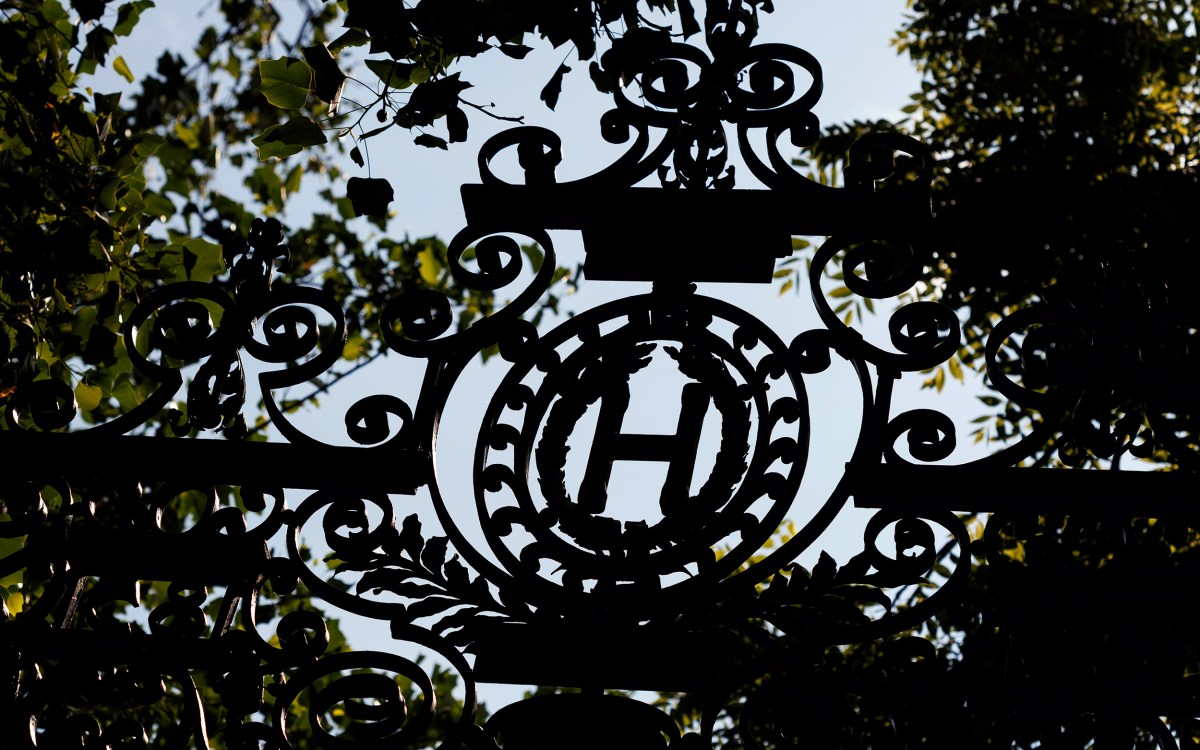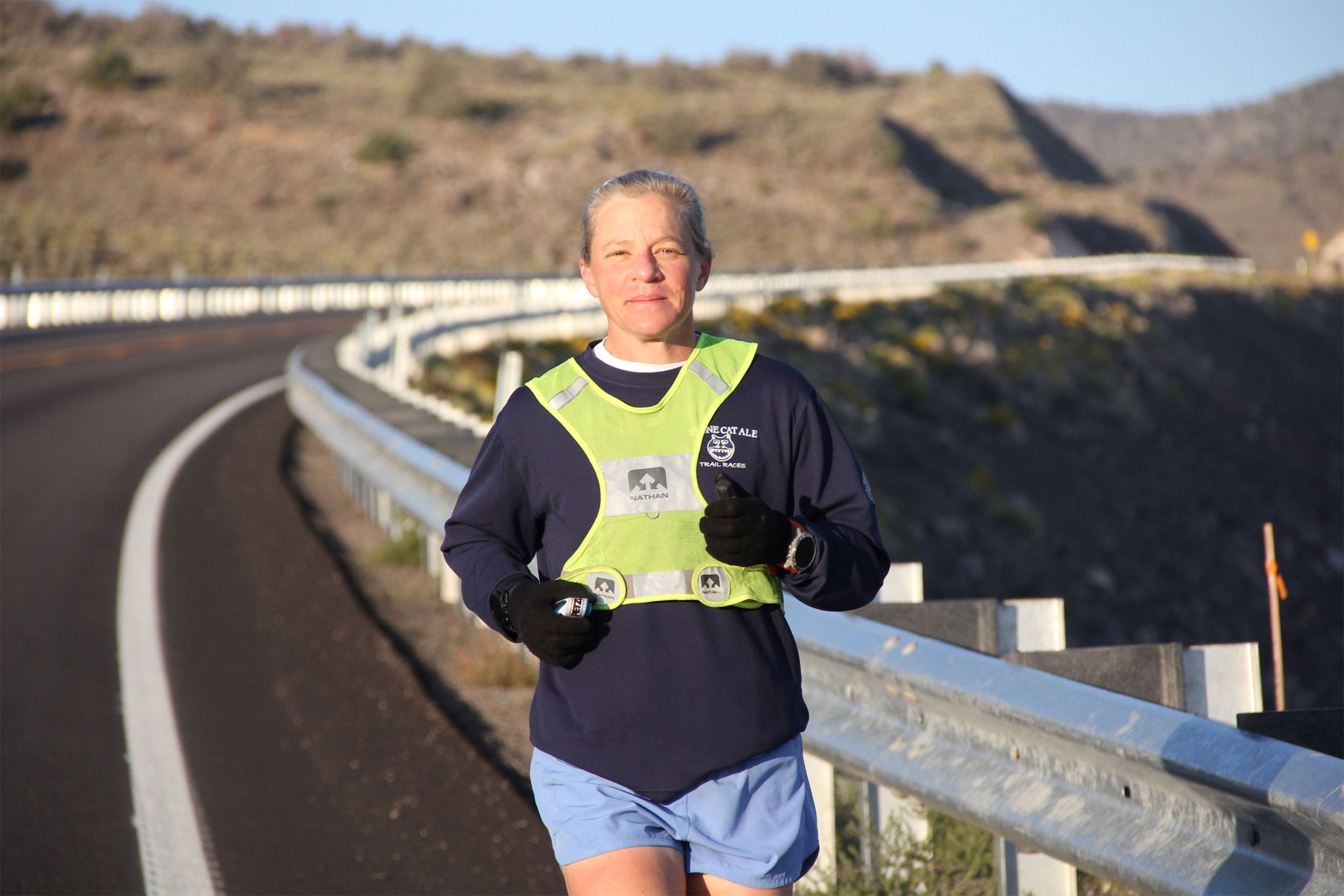
Courtesy of Jenny Hoffman
Jenny Hoffman sets world record through tears and traffic, falls and fertilizer
Physics professor runs across U.S. in 47 days, 12 hours, 35 minutes
Quantum physicist, mom of three, and now, world record holder. Physics Professor Jenny Hoffman crossed the George Washington Bridge and headed for New York City Hall on Nov. 2 leading a throng of cheering supporters, having run more than 3,000 miles since leaving San Francisco City Hall Sept. 16.
Hoffman, 45, traversed the U.S. in 47 days, 12 hours, and 35 minutes. The previous record for women, set in 2017 by Sandra Villines, was 54 days, 16 hours, and 23 minutes. Hoffman, who was on sabbatical, ran 15 hours a day on six hours of sleep each night through seven grueling weeks with the support of a dedicated crew.
A three-time national ultrarunning champion, Hoffman had made a record attempt in 2019 but suffered a devastating knee injury more than 2,500 miles in that forced her to stop. “Through surgery and rehab and pandemic and work and family life, I have dreamed every single day for four years about redoing and completing this run,” Hoffman said on her website, where she chronicled her journey.
Hoffman plans to submit documentation to Guinness World Records to certify her accomplishment. She’s already been credited the record by Fastest Known Time. Her next race will be the 24-Hour World Championship in December in Taipei, Taiwan.
As she rested her legs in her Cambridge office, the Gazette asked Hoffman to reflect on her record-setting run, and what’s next.
Q&A
Jenny Hoffman
GAZETTE: I’m sure you’ve been asked this many times. But, why?
HOFFMAN: I give different answers because there are many reasons. But fundamentally, I am really driven to tackle the biggest, hardest, longest, highest thing in front of me. That’s always been almost a compulsion. Since I was a child, I thought about crossing the U.S. under my own power. It’s been a dream in the back of my mind for a long time.
GAZETTE: What were some of the things you thought about while running? Was one of those things physics?
HOFFMAN: No! This was a break from physics. Some of it was the really mundane things, like calculating mileage, or what am I going to eat at the next aid station, or remembering to put on sunscreen. That consumed quite a large fraction of my bandwidth.
And then, it was a lot of visualization of the end, and gratitude for the opportunity to do this, and thinking about the people I would see at the end. I also thought a lot about how I could capture this experience in words — to share in my daily online journal, or maybe in a book someday.
“Since I was a child, I thought about crossing the U.S. under my own power. It’s been a dream in the back of my mind for a long time.”
GAZETTE: What was the most beautiful thing you saw?
HOFFMAN: I think the absolute most beautiful moment of the run was in Utah at a 9,383-foot pass between Cottonwood and Eccles canyons. It was a full moon, and I hit the pass in the early morning. The sun was coming up, the moon was setting, the moon was pink, and the foliage was perfect. But I was also really sick at the time. The first two weeks were really rough. I had come down with a cold, I was dealing with altitude sickness, and I hadn’t fine-tuned my diet yet. So despite being the most beautiful, I would not say it was the best day.
Maybe the best moment of my life, though, was crossing the GW bridge and seeing so many friends there waiting. Wow. By the time I finished, I had a pack of 20 or 30 people that were just kind of accruing as I ran that last 12 miles. And I just thought, “What did I do to deserve this? Yes, I just ran 3,000 miles. But what did I do in the cosmic sense? How was this so magical?” I just think every human deserves a moment like that.
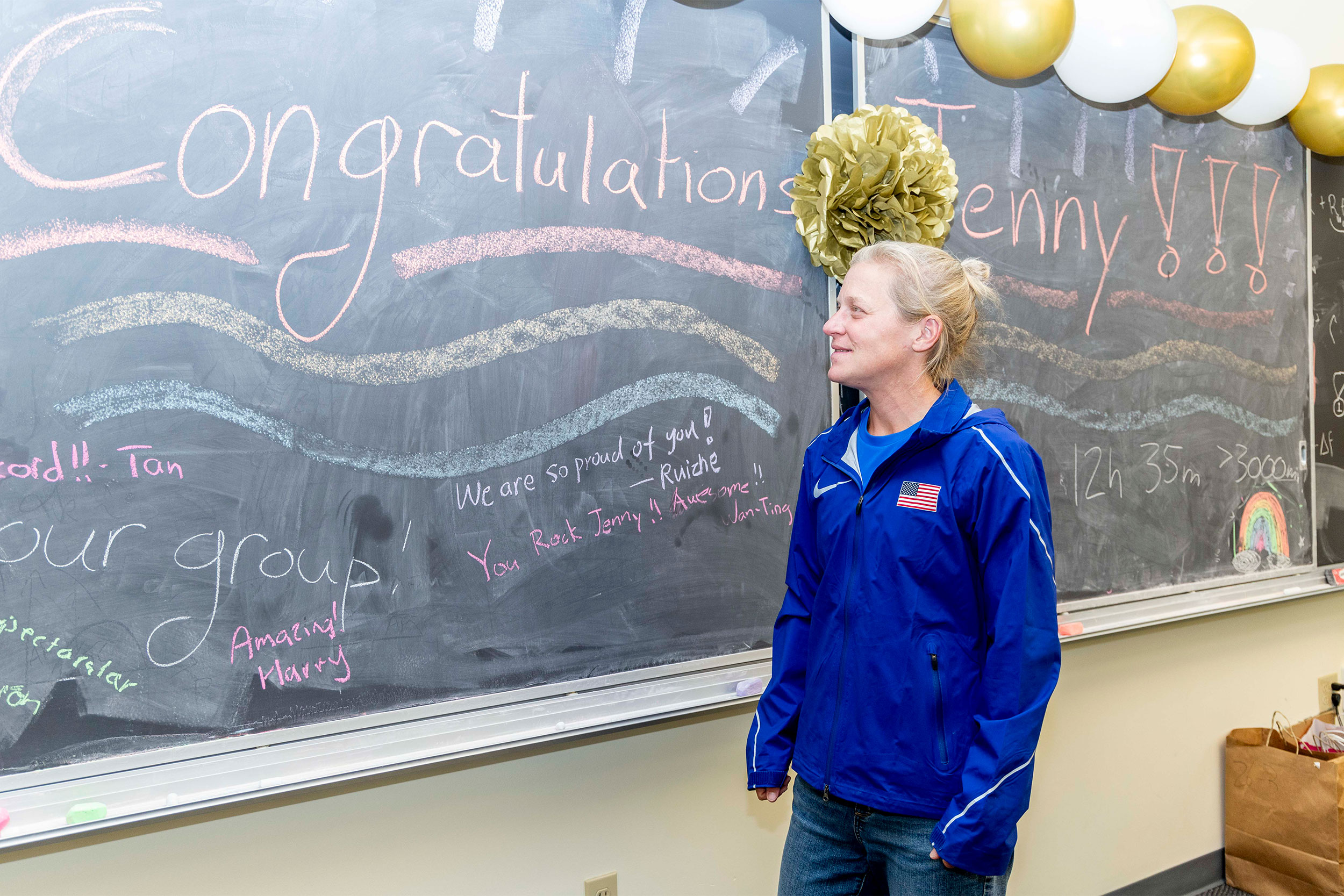
Jenny Hoffman in her Harvard office, decorated with messages of congratulations, just days after completing her historic run.
Photo by Dylan Goodman
GAZETTE: Did you ever hit rock bottom?
HOFFMAN: I cried. A lot. It was hard. I never seriously considered quitting because I knew how much people around me had given so that I could have this opportunity.
I think the hardest moment was in Nebraska. I hit Nebraska at peak harvest time, and I was running on a lot of dirt roads. One day there was a 44 mile-per-hour headwind, and all these John Deere trucks that were taking up the whole width of the road, and they have sharp blades and pokey things. The dust was so bad. I was wearing glasses to protect my eyes, but I didn’t have a mask. I got sprayed by a fertilizer truck. I was just so afraid I was going to get hit or harvested.
GAZETTE: What did you eat?
HOFFMAN: I was consuming about 8,000 calories a day. I ate eggs morning and night. People were so generous and gave me food along the way. I have a cousin-in-law who baked for me in Colorado and sent the most amazing peanut butter ganache and chocolate chip cookies. There was a woman in Nebraska who was so kind — on these dirt roads I was struggling on so much. She saw our crew vehicle with our “Run, Jenny, run!” sign. She said, “I want to give you something, but I don’t know. What do I have?” I said I was eating a lot eggs, so she grabbed 12 eggs from her chickens, and I had fresh eggs that night.
GAZETTE: What were some of the worst weather days?
HOFFMAN: We hit lightning and hail a couple of times. In the Nevada and Utah deserts, it can be 20 degrees in the early morning and 90 by midday. In Pennsylvania, we had three straight days of rain. Two of them were gentle. The middle one was just that solid, hard rain, like walls of drenching rain, the kind of rain where you can’t change into dry clothes because you’re going to be wet again. So I was cold and wet from 4 a.m. to 7 p.m.
GAZETTE: What was your go-to gear?
HOFFMAN: I went through 11 pairs of Hokas. I had two watches, one on each wrist, just in case, to make sure I had all the documentation. Then I had my GPS tracker, which broadcast my location every 10 minutes. I had a crew, so I was able to carry as little as possible. I did carry an emotional support Rice Krispies treat in my back pocket.
GAZETTE: You said this was a break from physics. Are you looking forward to getting back to academic life?
HOFFMAN: I love my students, and I feel really, really grateful that I have a great group of creative people who like each other, who work well as a team, and even while I was gone, they got the science done. I’m looking forward to catching up with them.
